Critical Analysis: Anti-Heroism in The Walking Dead & Luther
VerifiedAdded on 2019/10/31
|10
|3056
|369
Essay
AI Summary
This essay provides a critical analysis of anti-heroism, exploring the concept of characters who deviate from traditional heroic archetypes. The essay delves into the psychological aspects of the anti-hero, including the concept of the alter ego and the influence of external factors on human behavior. The analysis focuses on two television series, *The Walking Dead* and *Luther*, examining the protagonists, Rick Grimes and DCI John Luther, respectively, as examples of anti-heroes. The essay discusses their flawed characteristics, moral ambiguities, and the ways in which they challenge conventional notions of heroism. It explores how these characters navigate complex situations, make difficult choices, and grapple with their pasts, highlighting the relatable nature of their struggles and the appeal of anti-heroes in contemporary storytelling. The essay also touches upon the role of these characters in reflecting the complexities of human nature and societal values, and how these characters showcase that individuals can be good, even while struggling with their own selfish needs.
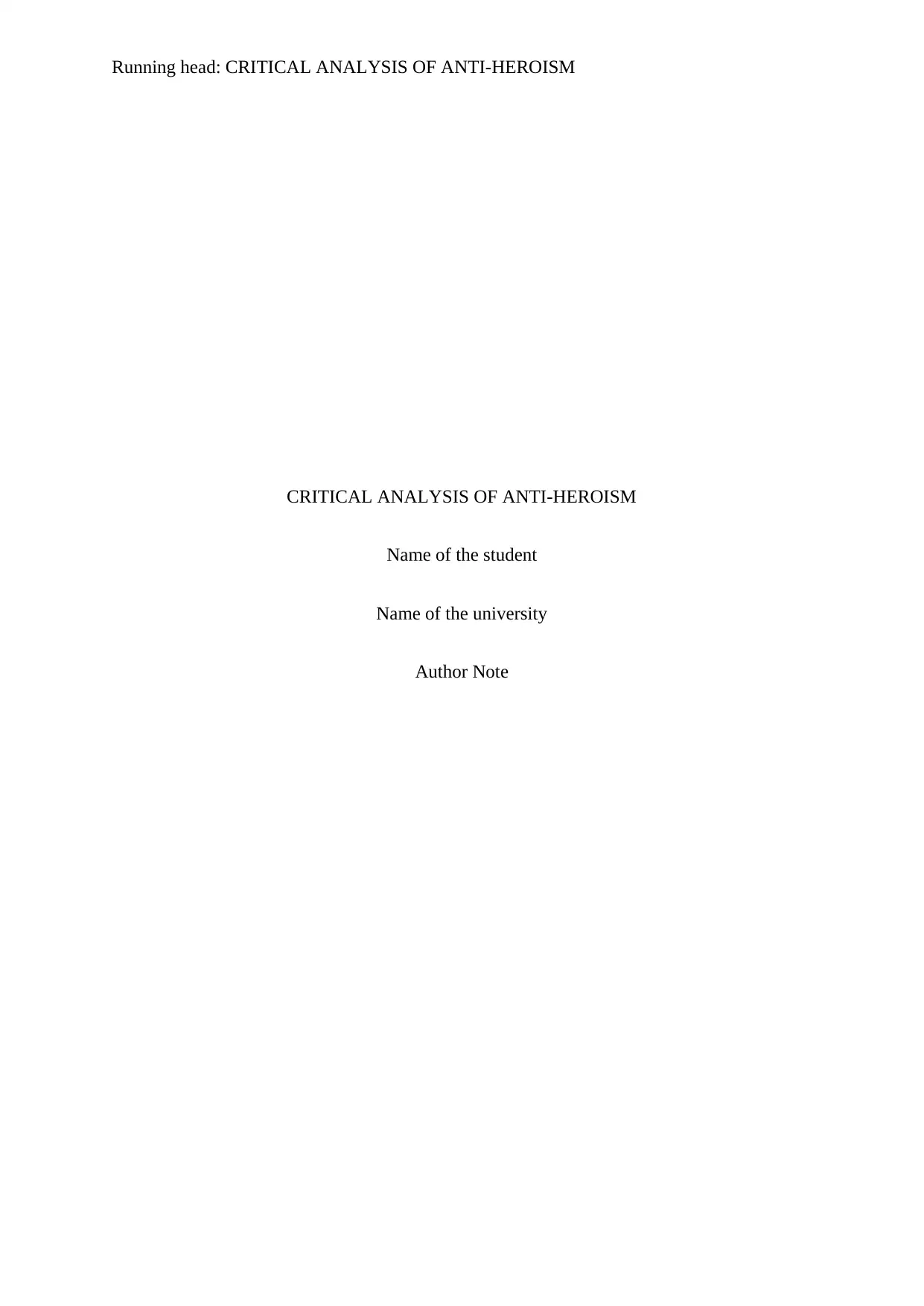
Running head: CRITICAL ANALYSIS OF ANTI-HEROISM
CRITICAL ANALYSIS OF ANTI-HEROISM
Name of the student
Name of the university
Author Note
CRITICAL ANALYSIS OF ANTI-HEROISM
Name of the student
Name of the university
Author Note
Paraphrase This Document
Need a fresh take? Get an instant paraphrase of this document with our AI Paraphraser
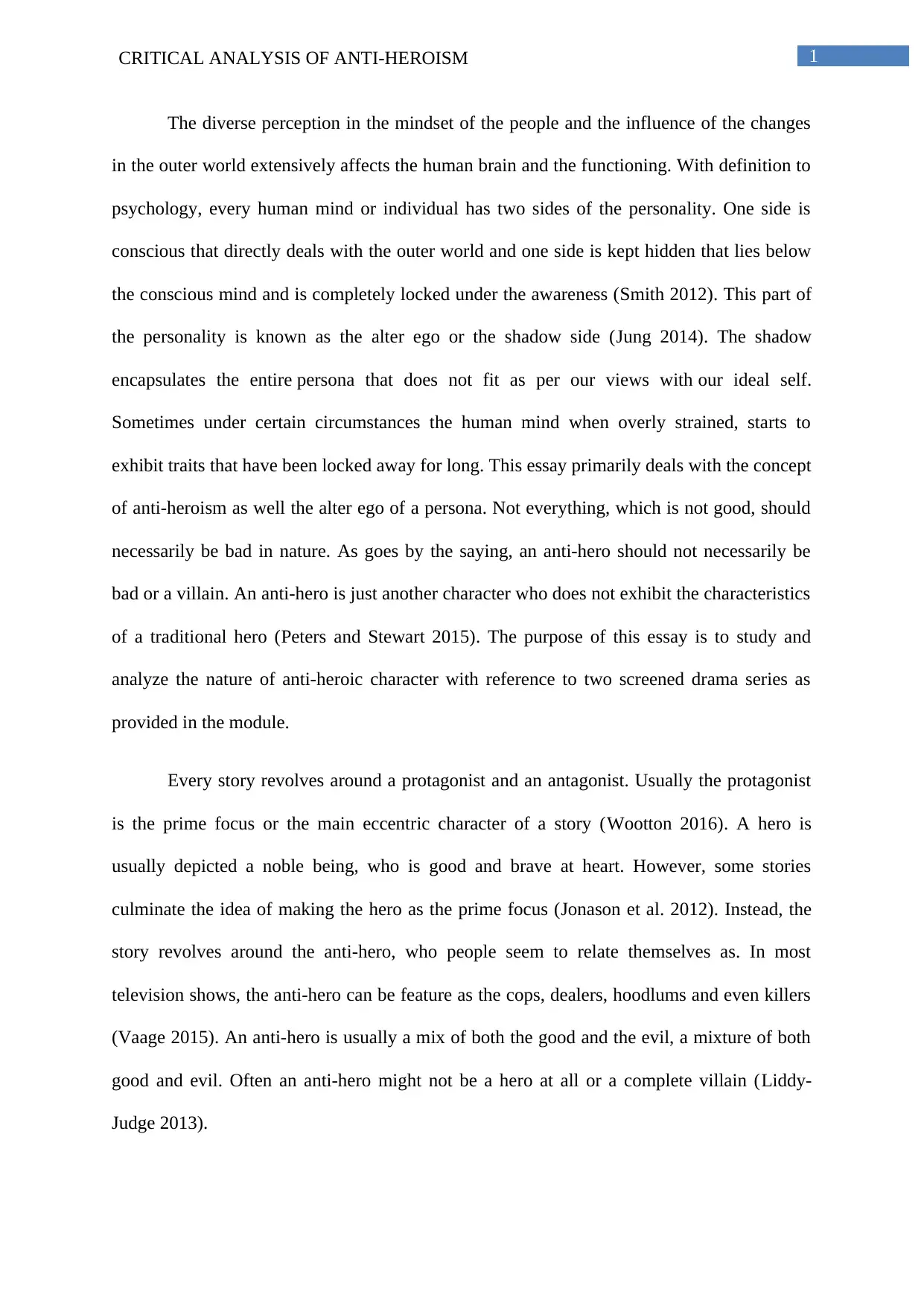
1CRITICAL ANALYSIS OF ANTI-HEROISM
The diverse perception in the mindset of the people and the influence of the changes
in the outer world extensively affects the human brain and the functioning. With definition to
psychology, every human mind or individual has two sides of the personality. One side is
conscious that directly deals with the outer world and one side is kept hidden that lies below
the conscious mind and is completely locked under the awareness (Smith 2012). This part of
the personality is known as the alter ego or the shadow side (Jung 2014). The shadow
encapsulates the entire persona that does not fit as per our views with our ideal self.
Sometimes under certain circumstances the human mind when overly strained, starts to
exhibit traits that have been locked away for long. This essay primarily deals with the concept
of anti-heroism as well the alter ego of a persona. Not everything, which is not good, should
necessarily be bad in nature. As goes by the saying, an anti-hero should not necessarily be
bad or a villain. An anti-hero is just another character who does not exhibit the characteristics
of a traditional hero (Peters and Stewart 2015). The purpose of this essay is to study and
analyze the nature of anti-heroic character with reference to two screened drama series as
provided in the module.
Every story revolves around a protagonist and an antagonist. Usually the protagonist
is the prime focus or the main eccentric character of a story (Wootton 2016). A hero is
usually depicted a noble being, who is good and brave at heart. However, some stories
culminate the idea of making the hero as the prime focus (Jonason et al. 2012). Instead, the
story revolves around the anti-hero, who people seem to relate themselves as. In most
television shows, the anti-hero can be feature as the cops, dealers, hoodlums and even killers
(Vaage 2015). An anti-hero is usually a mix of both the good and the evil, a mixture of both
good and evil. Often an anti-hero might not be a hero at all or a complete villain (Liddy-
Judge 2013).
The diverse perception in the mindset of the people and the influence of the changes
in the outer world extensively affects the human brain and the functioning. With definition to
psychology, every human mind or individual has two sides of the personality. One side is
conscious that directly deals with the outer world and one side is kept hidden that lies below
the conscious mind and is completely locked under the awareness (Smith 2012). This part of
the personality is known as the alter ego or the shadow side (Jung 2014). The shadow
encapsulates the entire persona that does not fit as per our views with our ideal self.
Sometimes under certain circumstances the human mind when overly strained, starts to
exhibit traits that have been locked away for long. This essay primarily deals with the concept
of anti-heroism as well the alter ego of a persona. Not everything, which is not good, should
necessarily be bad in nature. As goes by the saying, an anti-hero should not necessarily be
bad or a villain. An anti-hero is just another character who does not exhibit the characteristics
of a traditional hero (Peters and Stewart 2015). The purpose of this essay is to study and
analyze the nature of anti-heroic character with reference to two screened drama series as
provided in the module.
Every story revolves around a protagonist and an antagonist. Usually the protagonist
is the prime focus or the main eccentric character of a story (Wootton 2016). A hero is
usually depicted a noble being, who is good and brave at heart. However, some stories
culminate the idea of making the hero as the prime focus (Jonason et al. 2012). Instead, the
story revolves around the anti-hero, who people seem to relate themselves as. In most
television shows, the anti-hero can be feature as the cops, dealers, hoodlums and even killers
(Vaage 2015). An anti-hero is usually a mix of both the good and the evil, a mixture of both
good and evil. Often an anti-hero might not be a hero at all or a complete villain (Liddy-
Judge 2013).
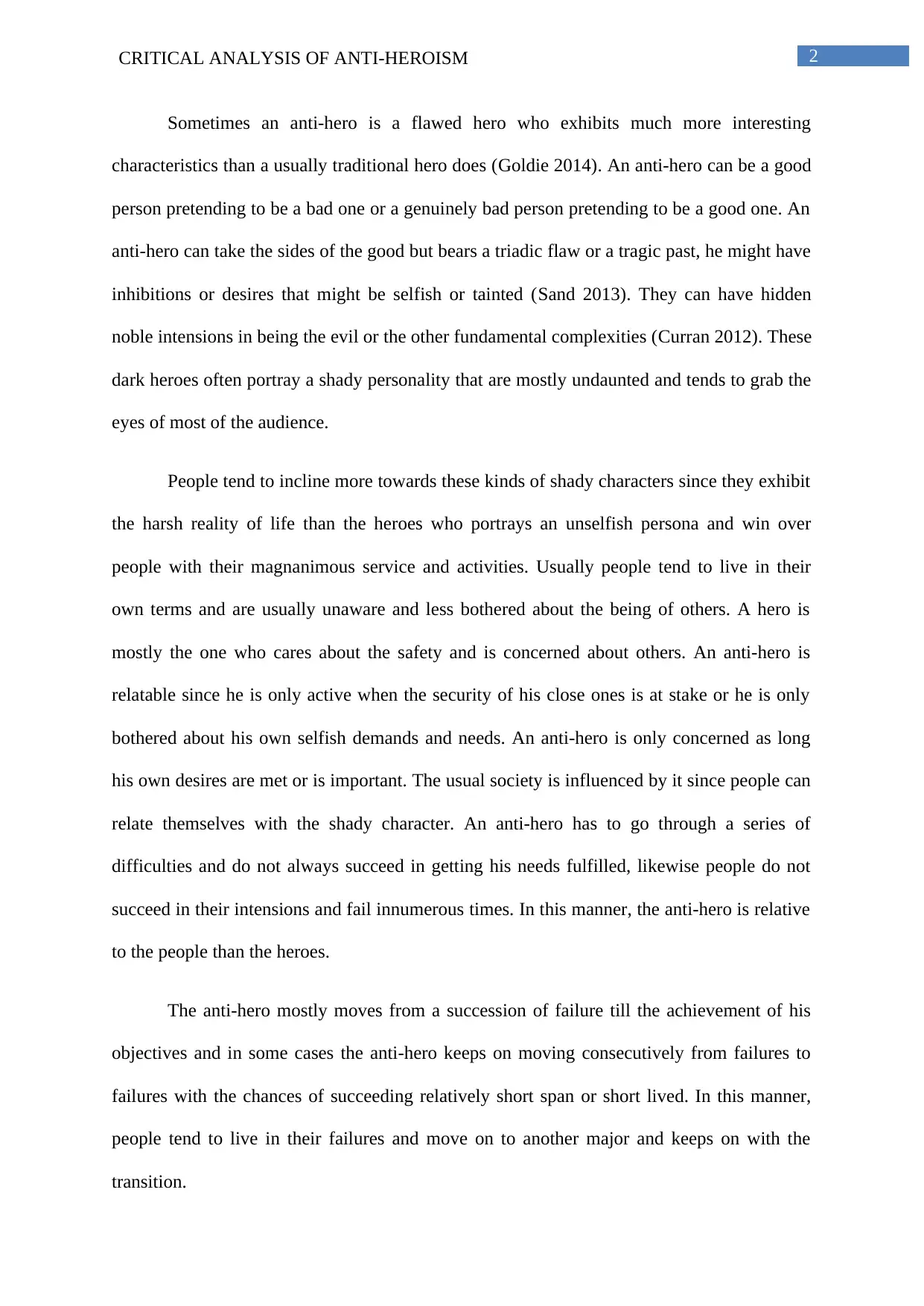
2CRITICAL ANALYSIS OF ANTI-HEROISM
Sometimes an anti-hero is a flawed hero who exhibits much more interesting
characteristics than a usually traditional hero does (Goldie 2014). An anti-hero can be a good
person pretending to be a bad one or a genuinely bad person pretending to be a good one. An
anti-hero can take the sides of the good but bears a triadic flaw or a tragic past, he might have
inhibitions or desires that might be selfish or tainted (Sand 2013). They can have hidden
noble intensions in being the evil or the other fundamental complexities (Curran 2012). These
dark heroes often portray a shady personality that are mostly undaunted and tends to grab the
eyes of most of the audience.
People tend to incline more towards these kinds of shady characters since they exhibit
the harsh reality of life than the heroes who portrays an unselfish persona and win over
people with their magnanimous service and activities. Usually people tend to live in their
own terms and are usually unaware and less bothered about the being of others. A hero is
mostly the one who cares about the safety and is concerned about others. An anti-hero is
relatable since he is only active when the security of his close ones is at stake or he is only
bothered about his own selfish demands and needs. An anti-hero is only concerned as long
his own desires are met or is important. The usual society is influenced by it since people can
relate themselves with the shady character. An anti-hero has to go through a series of
difficulties and do not always succeed in getting his needs fulfilled, likewise people do not
succeed in their intensions and fail innumerous times. In this manner, the anti-hero is relative
to the people than the heroes.
The anti-hero mostly moves from a succession of failure till the achievement of his
objectives and in some cases the anti-hero keeps on moving consecutively from failures to
failures with the chances of succeeding relatively short span or short lived. In this manner,
people tend to live in their failures and move on to another major and keeps on with the
transition.
Sometimes an anti-hero is a flawed hero who exhibits much more interesting
characteristics than a usually traditional hero does (Goldie 2014). An anti-hero can be a good
person pretending to be a bad one or a genuinely bad person pretending to be a good one. An
anti-hero can take the sides of the good but bears a triadic flaw or a tragic past, he might have
inhibitions or desires that might be selfish or tainted (Sand 2013). They can have hidden
noble intensions in being the evil or the other fundamental complexities (Curran 2012). These
dark heroes often portray a shady personality that are mostly undaunted and tends to grab the
eyes of most of the audience.
People tend to incline more towards these kinds of shady characters since they exhibit
the harsh reality of life than the heroes who portrays an unselfish persona and win over
people with their magnanimous service and activities. Usually people tend to live in their
own terms and are usually unaware and less bothered about the being of others. A hero is
mostly the one who cares about the safety and is concerned about others. An anti-hero is
relatable since he is only active when the security of his close ones is at stake or he is only
bothered about his own selfish demands and needs. An anti-hero is only concerned as long
his own desires are met or is important. The usual society is influenced by it since people can
relate themselves with the shady character. An anti-hero has to go through a series of
difficulties and do not always succeed in getting his needs fulfilled, likewise people do not
succeed in their intensions and fail innumerous times. In this manner, the anti-hero is relative
to the people than the heroes.
The anti-hero mostly moves from a succession of failure till the achievement of his
objectives and in some cases the anti-hero keeps on moving consecutively from failures to
failures with the chances of succeeding relatively short span or short lived. In this manner,
people tend to live in their failures and move on to another major and keeps on with the
transition.
⊘ This is a preview!⊘
Do you want full access?
Subscribe today to unlock all pages.

Trusted by 1+ million students worldwide
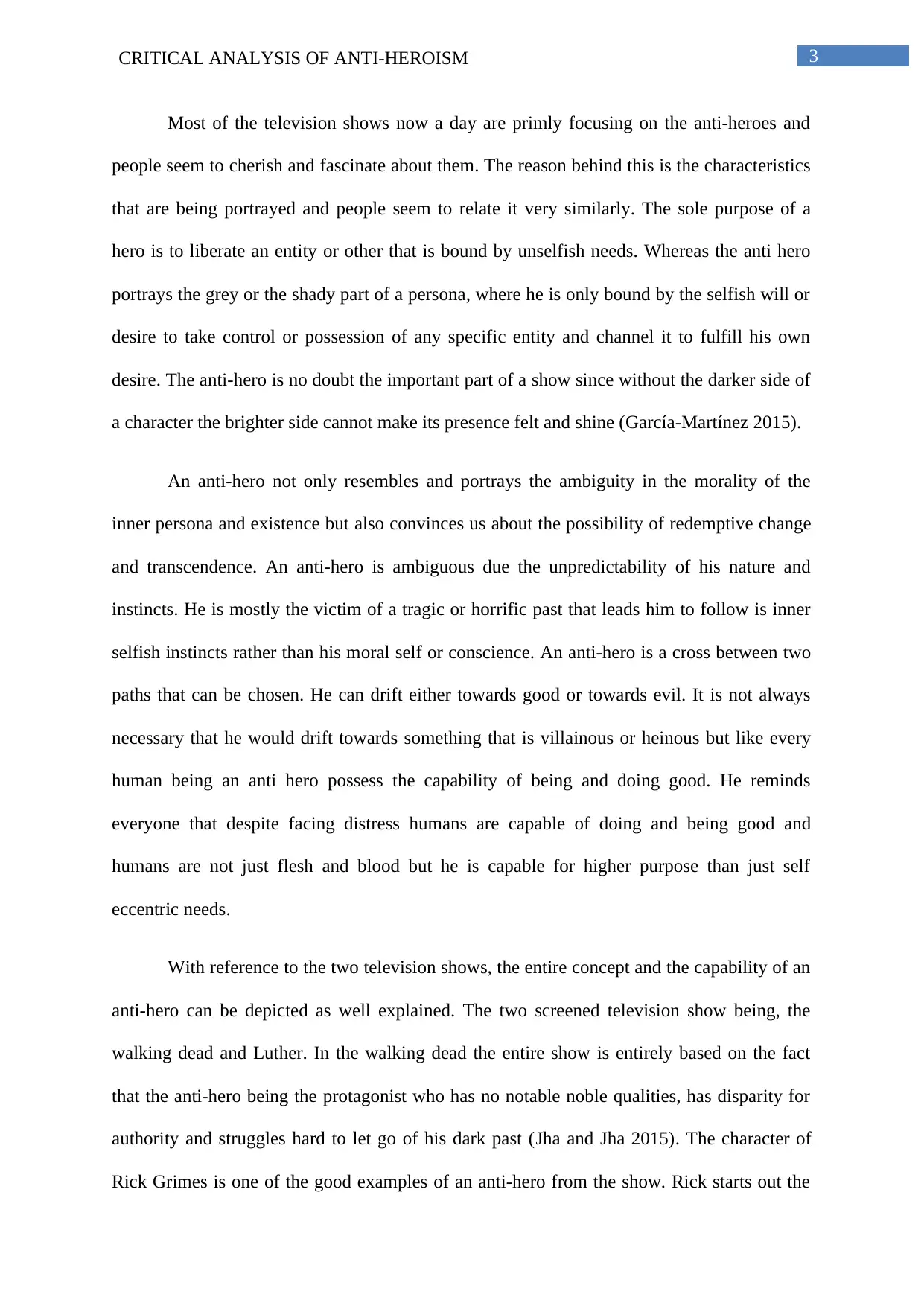
3CRITICAL ANALYSIS OF ANTI-HEROISM
Most of the television shows now a day are primly focusing on the anti-heroes and
people seem to cherish and fascinate about them. The reason behind this is the characteristics
that are being portrayed and people seem to relate it very similarly. The sole purpose of a
hero is to liberate an entity or other that is bound by unselfish needs. Whereas the anti hero
portrays the grey or the shady part of a persona, where he is only bound by the selfish will or
desire to take control or possession of any specific entity and channel it to fulfill his own
desire. The anti-hero is no doubt the important part of a show since without the darker side of
a character the brighter side cannot make its presence felt and shine (García-Martínez 2015).
An anti-hero not only resembles and portrays the ambiguity in the morality of the
inner persona and existence but also convinces us about the possibility of redemptive change
and transcendence. An anti-hero is ambiguous due the unpredictability of his nature and
instincts. He is mostly the victim of a tragic or horrific past that leads him to follow is inner
selfish instincts rather than his moral self or conscience. An anti-hero is a cross between two
paths that can be chosen. He can drift either towards good or towards evil. It is not always
necessary that he would drift towards something that is villainous or heinous but like every
human being an anti hero possess the capability of being and doing good. He reminds
everyone that despite facing distress humans are capable of doing and being good and
humans are not just flesh and blood but he is capable for higher purpose than just self
eccentric needs.
With reference to the two television shows, the entire concept and the capability of an
anti-hero can be depicted as well explained. The two screened television show being, the
walking dead and Luther. In the walking dead the entire show is entirely based on the fact
that the anti-hero being the protagonist who has no notable noble qualities, has disparity for
authority and struggles hard to let go of his dark past (Jha and Jha 2015). The character of
Rick Grimes is one of the good examples of an anti-hero from the show. Rick starts out the
Most of the television shows now a day are primly focusing on the anti-heroes and
people seem to cherish and fascinate about them. The reason behind this is the characteristics
that are being portrayed and people seem to relate it very similarly. The sole purpose of a
hero is to liberate an entity or other that is bound by unselfish needs. Whereas the anti hero
portrays the grey or the shady part of a persona, where he is only bound by the selfish will or
desire to take control or possession of any specific entity and channel it to fulfill his own
desire. The anti-hero is no doubt the important part of a show since without the darker side of
a character the brighter side cannot make its presence felt and shine (García-Martínez 2015).
An anti-hero not only resembles and portrays the ambiguity in the morality of the
inner persona and existence but also convinces us about the possibility of redemptive change
and transcendence. An anti-hero is ambiguous due the unpredictability of his nature and
instincts. He is mostly the victim of a tragic or horrific past that leads him to follow is inner
selfish instincts rather than his moral self or conscience. An anti-hero is a cross between two
paths that can be chosen. He can drift either towards good or towards evil. It is not always
necessary that he would drift towards something that is villainous or heinous but like every
human being an anti hero possess the capability of being and doing good. He reminds
everyone that despite facing distress humans are capable of doing and being good and
humans are not just flesh and blood but he is capable for higher purpose than just self
eccentric needs.
With reference to the two television shows, the entire concept and the capability of an
anti-hero can be depicted as well explained. The two screened television show being, the
walking dead and Luther. In the walking dead the entire show is entirely based on the fact
that the anti-hero being the protagonist who has no notable noble qualities, has disparity for
authority and struggles hard to let go of his dark past (Jha and Jha 2015). The character of
Rick Grimes is one of the good examples of an anti-hero from the show. Rick starts out the
Paraphrase This Document
Need a fresh take? Get an instant paraphrase of this document with our AI Paraphraser
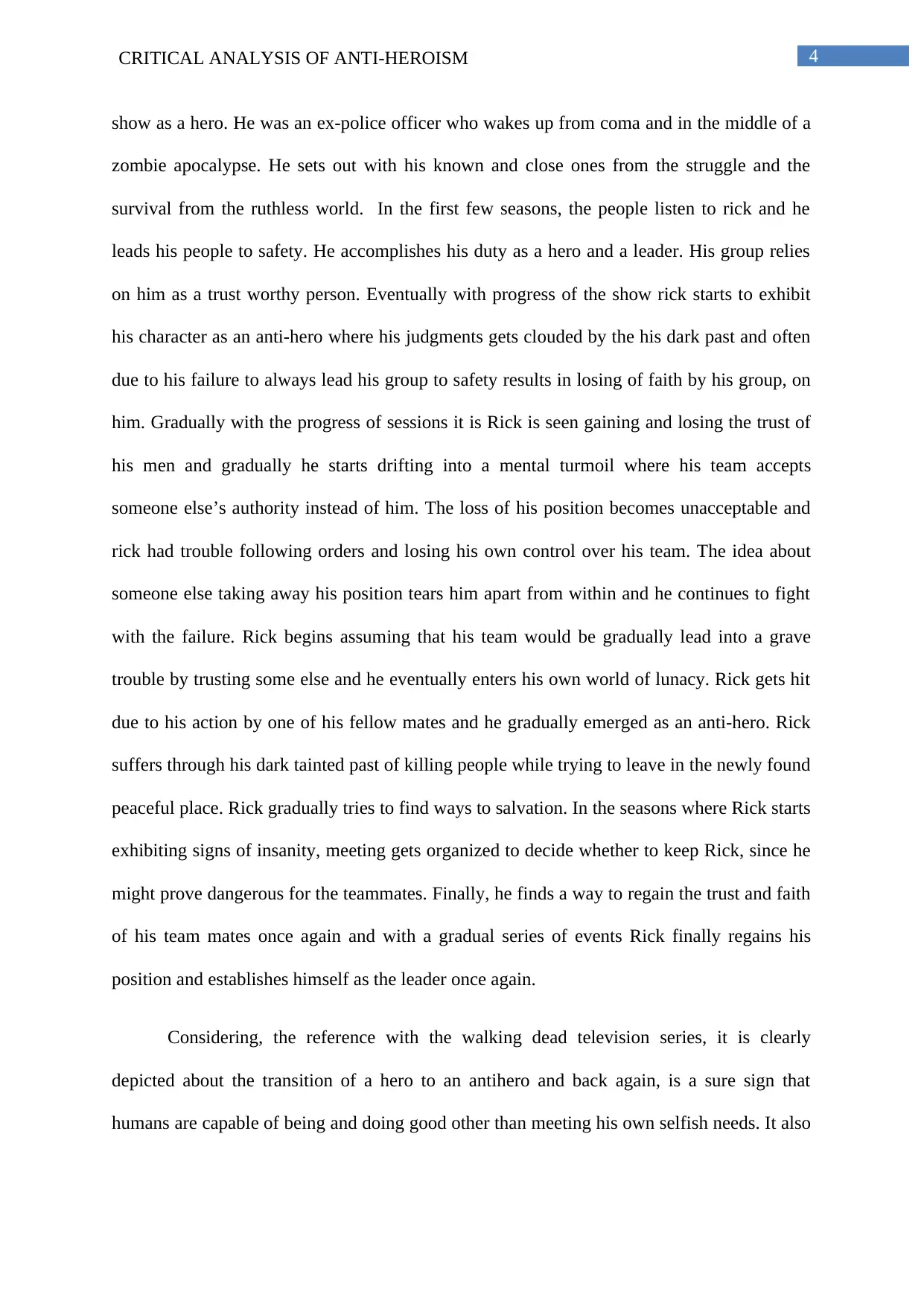
4CRITICAL ANALYSIS OF ANTI-HEROISM
show as a hero. He was an ex-police officer who wakes up from coma and in the middle of a
zombie apocalypse. He sets out with his known and close ones from the struggle and the
survival from the ruthless world. In the first few seasons, the people listen to rick and he
leads his people to safety. He accomplishes his duty as a hero and a leader. His group relies
on him as a trust worthy person. Eventually with progress of the show rick starts to exhibit
his character as an anti-hero where his judgments gets clouded by the his dark past and often
due to his failure to always lead his group to safety results in losing of faith by his group, on
him. Gradually with the progress of sessions it is Rick is seen gaining and losing the trust of
his men and gradually he starts drifting into a mental turmoil where his team accepts
someone else’s authority instead of him. The loss of his position becomes unacceptable and
rick had trouble following orders and losing his own control over his team. The idea about
someone else taking away his position tears him apart from within and he continues to fight
with the failure. Rick begins assuming that his team would be gradually lead into a grave
trouble by trusting some else and he eventually enters his own world of lunacy. Rick gets hit
due to his action by one of his fellow mates and he gradually emerged as an anti-hero. Rick
suffers through his dark tainted past of killing people while trying to leave in the newly found
peaceful place. Rick gradually tries to find ways to salvation. In the seasons where Rick starts
exhibiting signs of insanity, meeting gets organized to decide whether to keep Rick, since he
might prove dangerous for the teammates. Finally, he finds a way to regain the trust and faith
of his team mates once again and with a gradual series of events Rick finally regains his
position and establishes himself as the leader once again.
Considering, the reference with the walking dead television series, it is clearly
depicted about the transition of a hero to an antihero and back again, is a sure sign that
humans are capable of being and doing good other than meeting his own selfish needs. It also
show as a hero. He was an ex-police officer who wakes up from coma and in the middle of a
zombie apocalypse. He sets out with his known and close ones from the struggle and the
survival from the ruthless world. In the first few seasons, the people listen to rick and he
leads his people to safety. He accomplishes his duty as a hero and a leader. His group relies
on him as a trust worthy person. Eventually with progress of the show rick starts to exhibit
his character as an anti-hero where his judgments gets clouded by the his dark past and often
due to his failure to always lead his group to safety results in losing of faith by his group, on
him. Gradually with the progress of sessions it is Rick is seen gaining and losing the trust of
his men and gradually he starts drifting into a mental turmoil where his team accepts
someone else’s authority instead of him. The loss of his position becomes unacceptable and
rick had trouble following orders and losing his own control over his team. The idea about
someone else taking away his position tears him apart from within and he continues to fight
with the failure. Rick begins assuming that his team would be gradually lead into a grave
trouble by trusting some else and he eventually enters his own world of lunacy. Rick gets hit
due to his action by one of his fellow mates and he gradually emerged as an anti-hero. Rick
suffers through his dark tainted past of killing people while trying to leave in the newly found
peaceful place. Rick gradually tries to find ways to salvation. In the seasons where Rick starts
exhibiting signs of insanity, meeting gets organized to decide whether to keep Rick, since he
might prove dangerous for the teammates. Finally, he finds a way to regain the trust and faith
of his team mates once again and with a gradual series of events Rick finally regains his
position and establishes himself as the leader once again.
Considering, the reference with the walking dead television series, it is clearly
depicted about the transition of a hero to an antihero and back again, is a sure sign that
humans are capable of being and doing good other than meeting his own selfish needs. It also
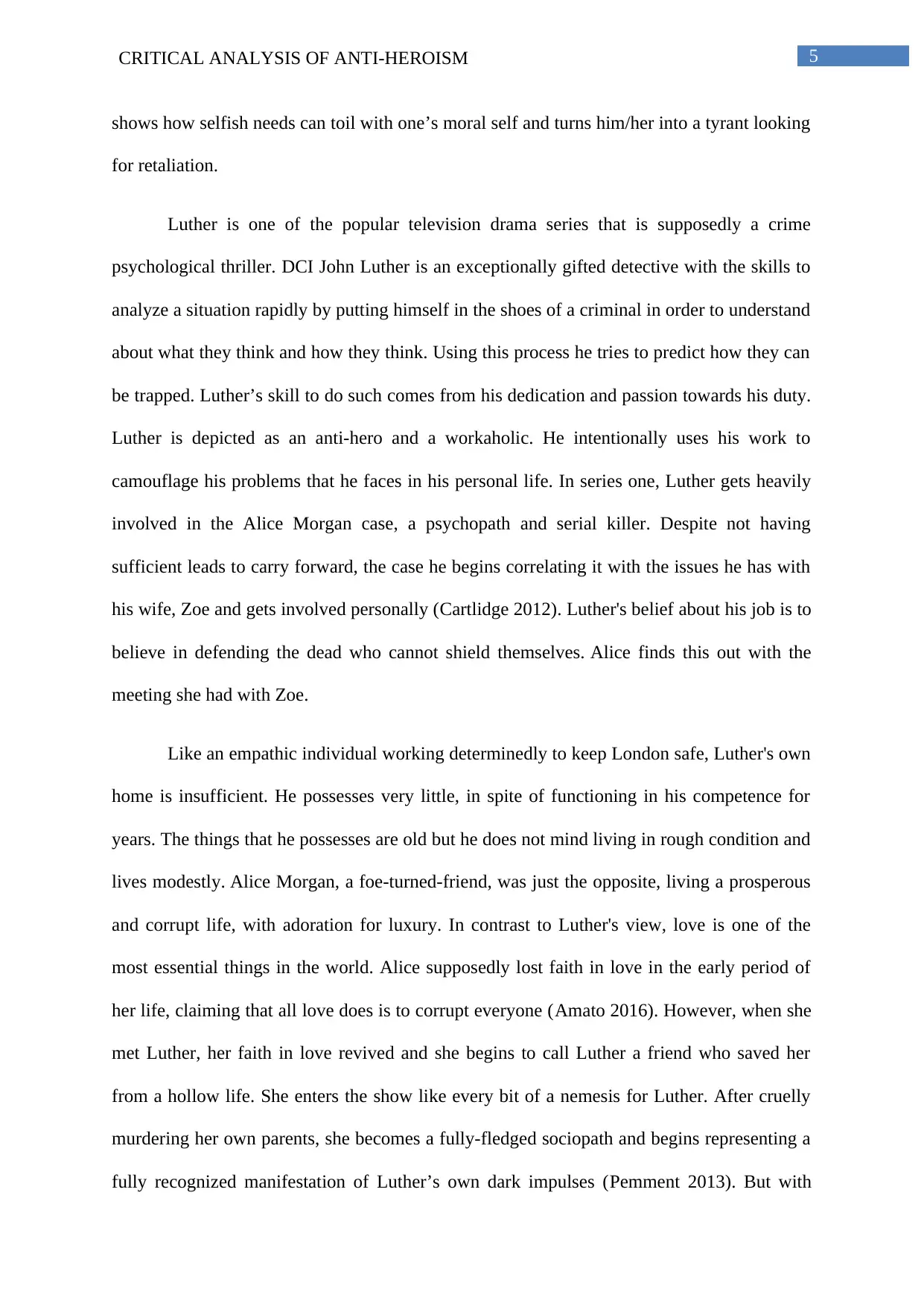
5CRITICAL ANALYSIS OF ANTI-HEROISM
shows how selfish needs can toil with one’s moral self and turns him/her into a tyrant looking
for retaliation.
Luther is one of the popular television drama series that is supposedly a crime
psychological thriller. DCI John Luther is an exceptionally gifted detective with the skills to
analyze a situation rapidly by putting himself in the shoes of a criminal in order to understand
about what they think and how they think. Using this process he tries to predict how they can
be trapped. Luther’s skill to do such comes from his dedication and passion towards his duty.
Luther is depicted as an anti-hero and a workaholic. He intentionally uses his work to
camouflage his problems that he faces in his personal life. In series one, Luther gets heavily
involved in the Alice Morgan case, a psychopath and serial killer. Despite not having
sufficient leads to carry forward, the case he begins correlating it with the issues he has with
his wife, Zoe and gets involved personally (Cartlidge 2012). Luther's belief about his job is to
believe in defending the dead who cannot shield themselves. Alice finds this out with the
meeting she had with Zoe.
Like an empathic individual working determinedly to keep London safe, Luther's own
home is insufficient. He possesses very little, in spite of functioning in his competence for
years. The things that he possesses are old but he does not mind living in rough condition and
lives modestly. Alice Morgan, a foe-turned-friend, was just the opposite, living a prosperous
and corrupt life, with adoration for luxury. In contrast to Luther's view, love is one of the
most essential things in the world. Alice supposedly lost faith in love in the early period of
her life, claiming that all love does is to corrupt everyone (Amato 2016). However, when she
met Luther, her faith in love revived and she begins to call Luther a friend who saved her
from a hollow life. She enters the show like every bit of a nemesis for Luther. After cruelly
murdering her own parents, she becomes a fully-fledged sociopath and begins representing a
fully recognized manifestation of Luther’s own dark impulses (Pemment 2013). But with
shows how selfish needs can toil with one’s moral self and turns him/her into a tyrant looking
for retaliation.
Luther is one of the popular television drama series that is supposedly a crime
psychological thriller. DCI John Luther is an exceptionally gifted detective with the skills to
analyze a situation rapidly by putting himself in the shoes of a criminal in order to understand
about what they think and how they think. Using this process he tries to predict how they can
be trapped. Luther’s skill to do such comes from his dedication and passion towards his duty.
Luther is depicted as an anti-hero and a workaholic. He intentionally uses his work to
camouflage his problems that he faces in his personal life. In series one, Luther gets heavily
involved in the Alice Morgan case, a psychopath and serial killer. Despite not having
sufficient leads to carry forward, the case he begins correlating it with the issues he has with
his wife, Zoe and gets involved personally (Cartlidge 2012). Luther's belief about his job is to
believe in defending the dead who cannot shield themselves. Alice finds this out with the
meeting she had with Zoe.
Like an empathic individual working determinedly to keep London safe, Luther's own
home is insufficient. He possesses very little, in spite of functioning in his competence for
years. The things that he possesses are old but he does not mind living in rough condition and
lives modestly. Alice Morgan, a foe-turned-friend, was just the opposite, living a prosperous
and corrupt life, with adoration for luxury. In contrast to Luther's view, love is one of the
most essential things in the world. Alice supposedly lost faith in love in the early period of
her life, claiming that all love does is to corrupt everyone (Amato 2016). However, when she
met Luther, her faith in love revived and she begins to call Luther a friend who saved her
from a hollow life. She enters the show like every bit of a nemesis for Luther. After cruelly
murdering her own parents, she becomes a fully-fledged sociopath and begins representing a
fully recognized manifestation of Luther’s own dark impulses (Pemment 2013). But with
⊘ This is a preview!⊘
Do you want full access?
Subscribe today to unlock all pages.

Trusted by 1+ million students worldwide
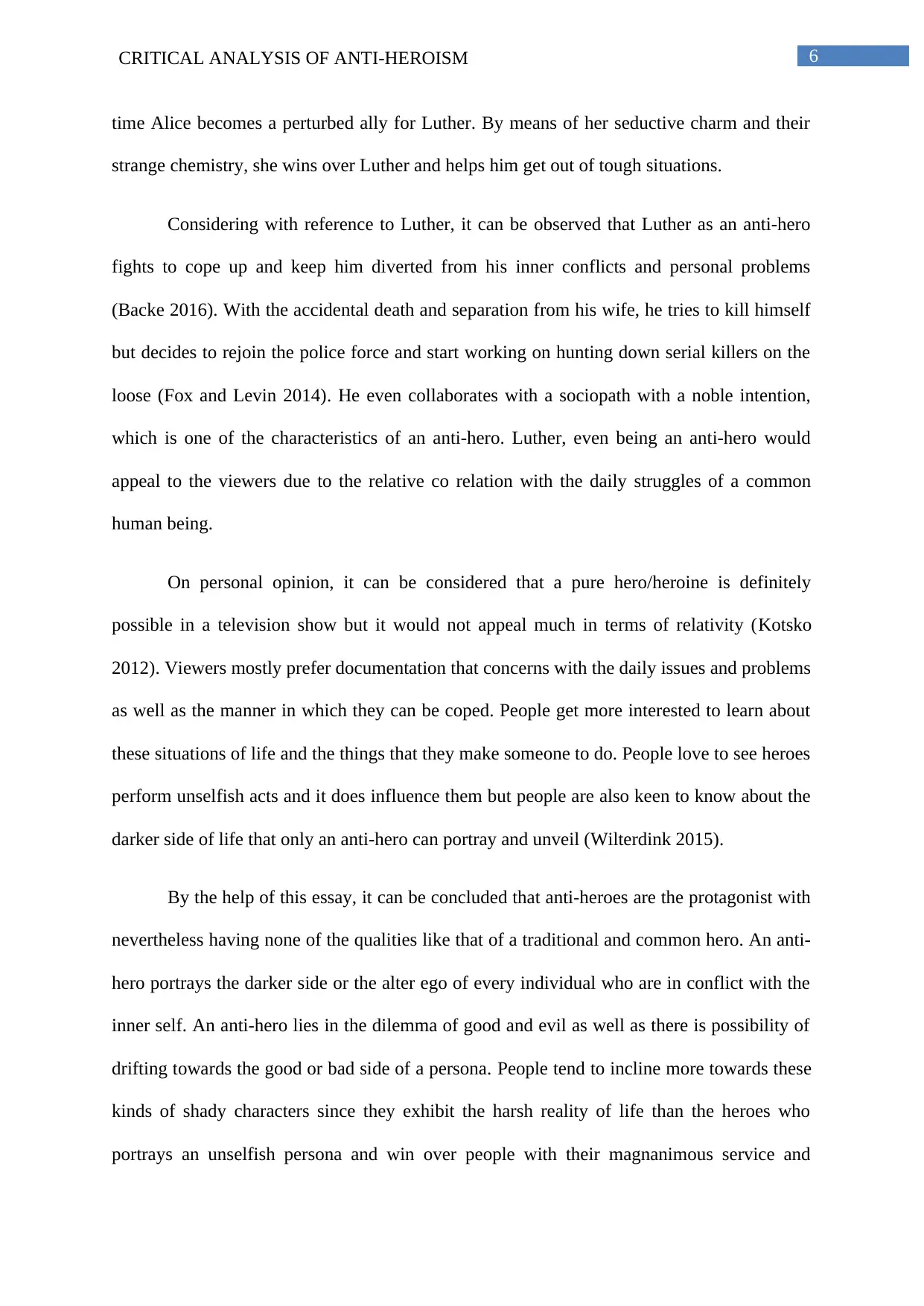
6CRITICAL ANALYSIS OF ANTI-HEROISM
time Alice becomes a perturbed ally for Luther. By means of her seductive charm and their
strange chemistry, she wins over Luther and helps him get out of tough situations.
Considering with reference to Luther, it can be observed that Luther as an anti-hero
fights to cope up and keep him diverted from his inner conflicts and personal problems
(Backe 2016). With the accidental death and separation from his wife, he tries to kill himself
but decides to rejoin the police force and start working on hunting down serial killers on the
loose (Fox and Levin 2014). He even collaborates with a sociopath with a noble intention,
which is one of the characteristics of an anti-hero. Luther, even being an anti-hero would
appeal to the viewers due to the relative co relation with the daily struggles of a common
human being.
On personal opinion, it can be considered that a pure hero/heroine is definitely
possible in a television show but it would not appeal much in terms of relativity (Kotsko
2012). Viewers mostly prefer documentation that concerns with the daily issues and problems
as well as the manner in which they can be coped. People get more interested to learn about
these situations of life and the things that they make someone to do. People love to see heroes
perform unselfish acts and it does influence them but people are also keen to know about the
darker side of life that only an anti-hero can portray and unveil (Wilterdink 2015).
By the help of this essay, it can be concluded that anti-heroes are the protagonist with
nevertheless having none of the qualities like that of a traditional and common hero. An anti-
hero portrays the darker side or the alter ego of every individual who are in conflict with the
inner self. An anti-hero lies in the dilemma of good and evil as well as there is possibility of
drifting towards the good or bad side of a persona. People tend to incline more towards these
kinds of shady characters since they exhibit the harsh reality of life than the heroes who
portrays an unselfish persona and win over people with their magnanimous service and
time Alice becomes a perturbed ally for Luther. By means of her seductive charm and their
strange chemistry, she wins over Luther and helps him get out of tough situations.
Considering with reference to Luther, it can be observed that Luther as an anti-hero
fights to cope up and keep him diverted from his inner conflicts and personal problems
(Backe 2016). With the accidental death and separation from his wife, he tries to kill himself
but decides to rejoin the police force and start working on hunting down serial killers on the
loose (Fox and Levin 2014). He even collaborates with a sociopath with a noble intention,
which is one of the characteristics of an anti-hero. Luther, even being an anti-hero would
appeal to the viewers due to the relative co relation with the daily struggles of a common
human being.
On personal opinion, it can be considered that a pure hero/heroine is definitely
possible in a television show but it would not appeal much in terms of relativity (Kotsko
2012). Viewers mostly prefer documentation that concerns with the daily issues and problems
as well as the manner in which they can be coped. People get more interested to learn about
these situations of life and the things that they make someone to do. People love to see heroes
perform unselfish acts and it does influence them but people are also keen to know about the
darker side of life that only an anti-hero can portray and unveil (Wilterdink 2015).
By the help of this essay, it can be concluded that anti-heroes are the protagonist with
nevertheless having none of the qualities like that of a traditional and common hero. An anti-
hero portrays the darker side or the alter ego of every individual who are in conflict with the
inner self. An anti-hero lies in the dilemma of good and evil as well as there is possibility of
drifting towards the good or bad side of a persona. People tend to incline more towards these
kinds of shady characters since they exhibit the harsh reality of life than the heroes who
portrays an unselfish persona and win over people with their magnanimous service and
Paraphrase This Document
Need a fresh take? Get an instant paraphrase of this document with our AI Paraphraser
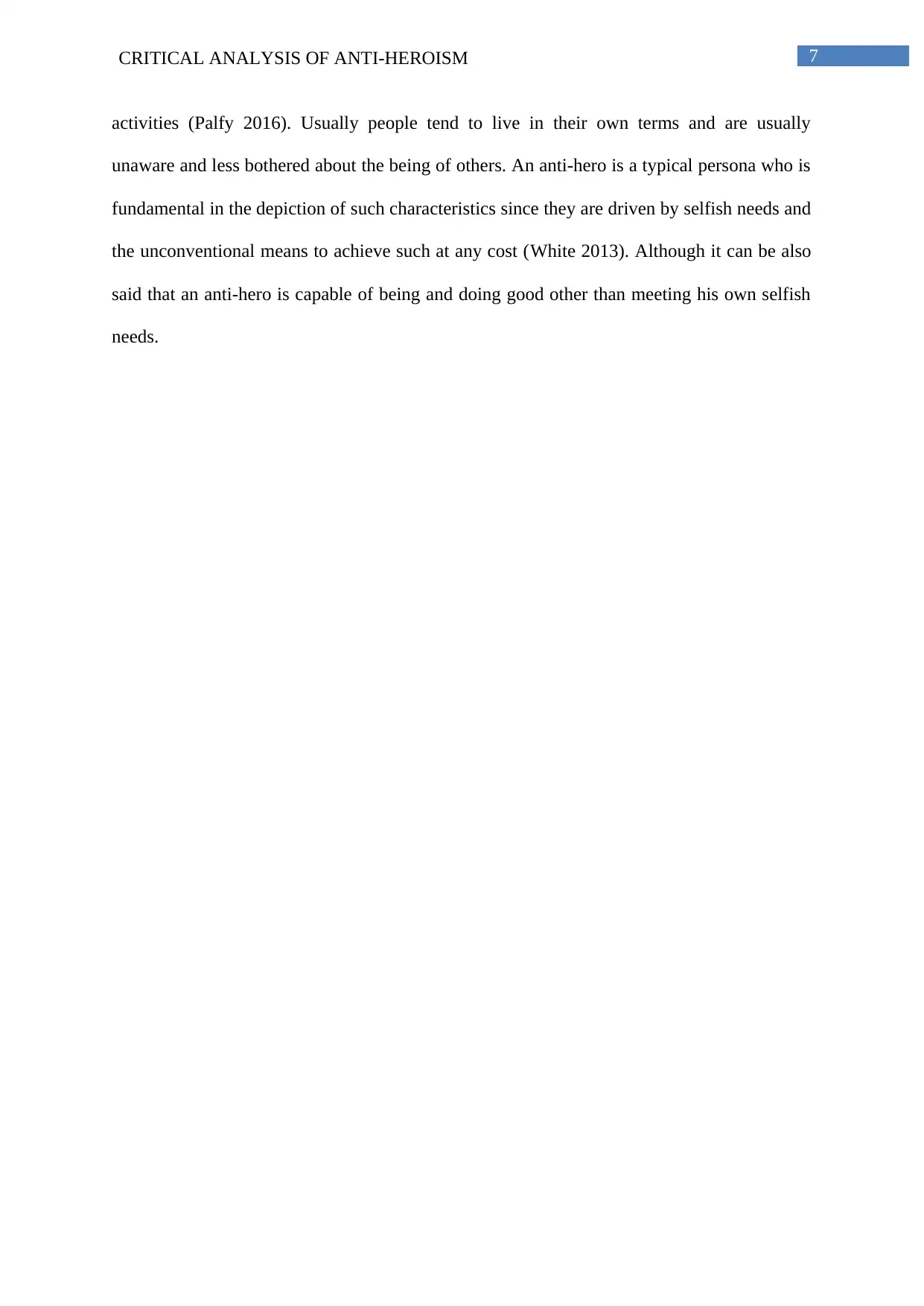
7CRITICAL ANALYSIS OF ANTI-HEROISM
activities (Palfy 2016). Usually people tend to live in their own terms and are usually
unaware and less bothered about the being of others. An anti-hero is a typical persona who is
fundamental in the depiction of such characteristics since they are driven by selfish needs and
the unconventional means to achieve such at any cost (White 2013). Although it can be also
said that an anti-hero is capable of being and doing good other than meeting his own selfish
needs.
activities (Palfy 2016). Usually people tend to live in their own terms and are usually
unaware and less bothered about the being of others. An anti-hero is a typical persona who is
fundamental in the depiction of such characteristics since they are driven by selfish needs and
the unconventional means to achieve such at any cost (White 2013). Although it can be also
said that an anti-hero is capable of being and doing good other than meeting his own selfish
needs.
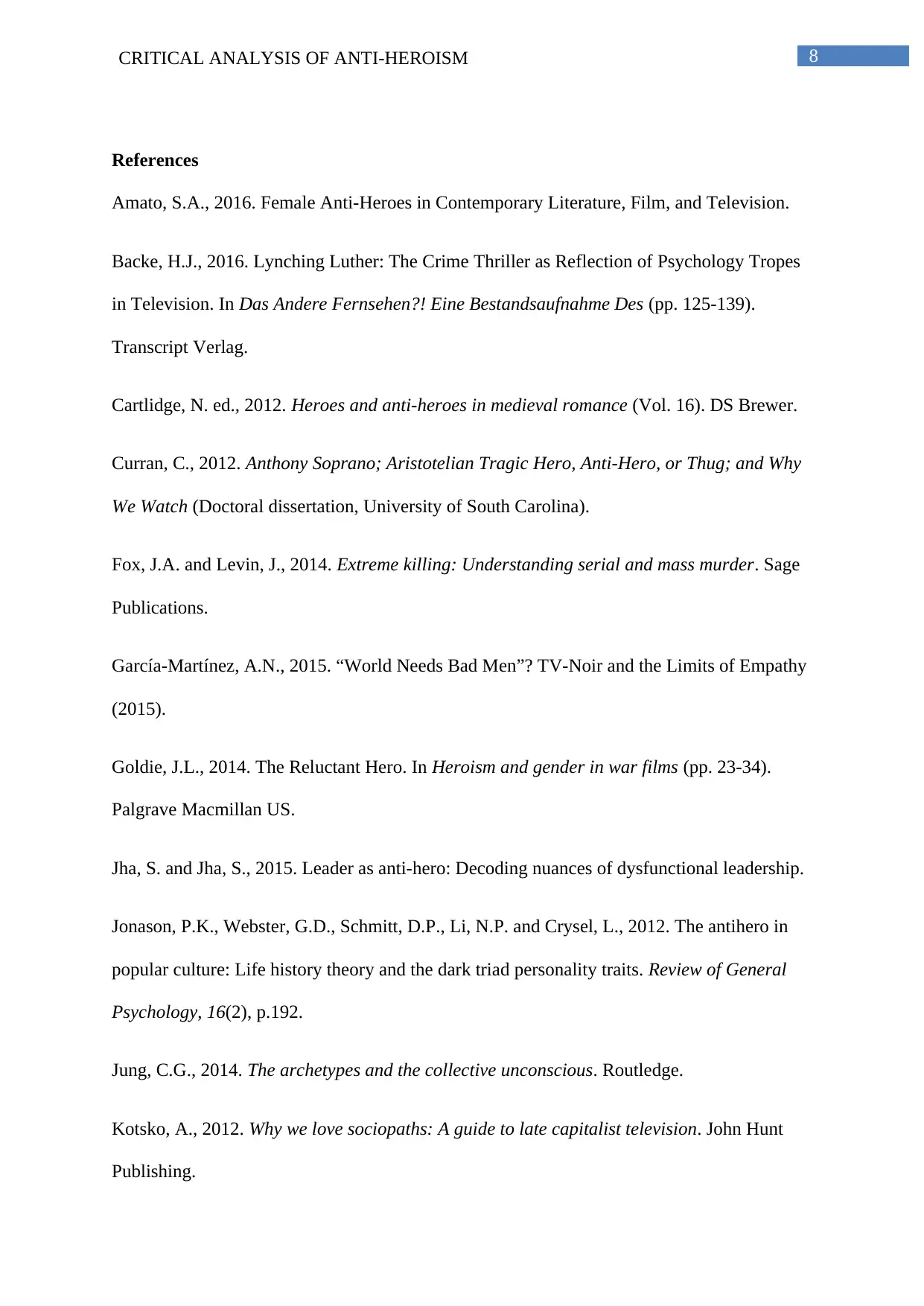
8CRITICAL ANALYSIS OF ANTI-HEROISM
References
Amato, S.A., 2016. Female Anti-Heroes in Contemporary Literature, Film, and Television.
Backe, H.J., 2016. Lynching Luther: The Crime Thriller as Reflection of Psychology Tropes
in Television. In Das Andere Fernsehen?! Eine Bestandsaufnahme Des (pp. 125-139).
Transcript Verlag.
Cartlidge, N. ed., 2012. Heroes and anti-heroes in medieval romance (Vol. 16). DS Brewer.
Curran, C., 2012. Anthony Soprano; Aristotelian Tragic Hero, Anti-Hero, or Thug; and Why
We Watch (Doctoral dissertation, University of South Carolina).
Fox, J.A. and Levin, J., 2014. Extreme killing: Understanding serial and mass murder. Sage
Publications.
García-Martínez, A.N., 2015. “World Needs Bad Men”? TV-Noir and the Limits of Empathy
(2015).
Goldie, J.L., 2014. The Reluctant Hero. In Heroism and gender in war films (pp. 23-34).
Palgrave Macmillan US.
Jha, S. and Jha, S., 2015. Leader as anti-hero: Decoding nuances of dysfunctional leadership.
Jonason, P.K., Webster, G.D., Schmitt, D.P., Li, N.P. and Crysel, L., 2012. The antihero in
popular culture: Life history theory and the dark triad personality traits. Review of General
Psychology, 16(2), p.192.
Jung, C.G., 2014. The archetypes and the collective unconscious. Routledge.
Kotsko, A., 2012. Why we love sociopaths: A guide to late capitalist television. John Hunt
Publishing.
References
Amato, S.A., 2016. Female Anti-Heroes in Contemporary Literature, Film, and Television.
Backe, H.J., 2016. Lynching Luther: The Crime Thriller as Reflection of Psychology Tropes
in Television. In Das Andere Fernsehen?! Eine Bestandsaufnahme Des (pp. 125-139).
Transcript Verlag.
Cartlidge, N. ed., 2012. Heroes and anti-heroes in medieval romance (Vol. 16). DS Brewer.
Curran, C., 2012. Anthony Soprano; Aristotelian Tragic Hero, Anti-Hero, or Thug; and Why
We Watch (Doctoral dissertation, University of South Carolina).
Fox, J.A. and Levin, J., 2014. Extreme killing: Understanding serial and mass murder. Sage
Publications.
García-Martínez, A.N., 2015. “World Needs Bad Men”? TV-Noir and the Limits of Empathy
(2015).
Goldie, J.L., 2014. The Reluctant Hero. In Heroism and gender in war films (pp. 23-34).
Palgrave Macmillan US.
Jha, S. and Jha, S., 2015. Leader as anti-hero: Decoding nuances of dysfunctional leadership.
Jonason, P.K., Webster, G.D., Schmitt, D.P., Li, N.P. and Crysel, L., 2012. The antihero in
popular culture: Life history theory and the dark triad personality traits. Review of General
Psychology, 16(2), p.192.
Jung, C.G., 2014. The archetypes and the collective unconscious. Routledge.
Kotsko, A., 2012. Why we love sociopaths: A guide to late capitalist television. John Hunt
Publishing.
⊘ This is a preview!⊘
Do you want full access?
Subscribe today to unlock all pages.

Trusted by 1+ million students worldwide
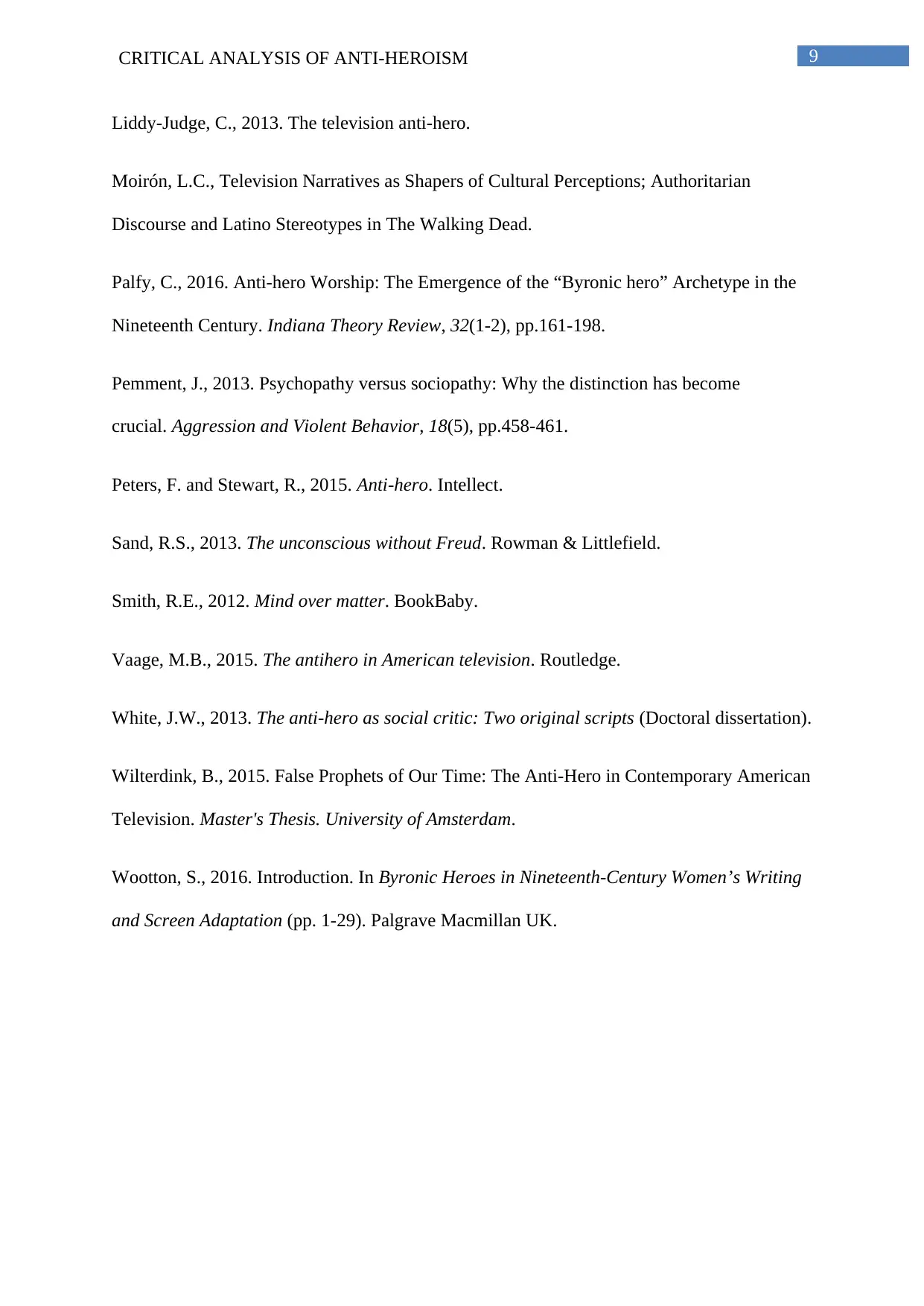
9CRITICAL ANALYSIS OF ANTI-HEROISM
Liddy-Judge, C., 2013. The television anti-hero.
Moirón, L.C., Television Narratives as Shapers of Cultural Perceptions; Authoritarian
Discourse and Latino Stereotypes in The Walking Dead.
Palfy, C., 2016. Anti-hero Worship: The Emergence of the “Byronic hero” Archetype in the
Nineteenth Century. Indiana Theory Review, 32(1-2), pp.161-198.
Pemment, J., 2013. Psychopathy versus sociopathy: Why the distinction has become
crucial. Aggression and Violent Behavior, 18(5), pp.458-461.
Peters, F. and Stewart, R., 2015. Anti-hero. Intellect.
Sand, R.S., 2013. The unconscious without Freud. Rowman & Littlefield.
Smith, R.E., 2012. Mind over matter. BookBaby.
Vaage, M.B., 2015. The antihero in American television. Routledge.
White, J.W., 2013. The anti-hero as social critic: Two original scripts (Doctoral dissertation).
Wilterdink, B., 2015. False Prophets of Our Time: The Anti-Hero in Contemporary American
Television. Master's Thesis. University of Amsterdam.
Wootton, S., 2016. Introduction. In Byronic Heroes in Nineteenth-Century Women’s Writing
and Screen Adaptation (pp. 1-29). Palgrave Macmillan UK.
Liddy-Judge, C., 2013. The television anti-hero.
Moirón, L.C., Television Narratives as Shapers of Cultural Perceptions; Authoritarian
Discourse and Latino Stereotypes in The Walking Dead.
Palfy, C., 2016. Anti-hero Worship: The Emergence of the “Byronic hero” Archetype in the
Nineteenth Century. Indiana Theory Review, 32(1-2), pp.161-198.
Pemment, J., 2013. Psychopathy versus sociopathy: Why the distinction has become
crucial. Aggression and Violent Behavior, 18(5), pp.458-461.
Peters, F. and Stewart, R., 2015. Anti-hero. Intellect.
Sand, R.S., 2013. The unconscious without Freud. Rowman & Littlefield.
Smith, R.E., 2012. Mind over matter. BookBaby.
Vaage, M.B., 2015. The antihero in American television. Routledge.
White, J.W., 2013. The anti-hero as social critic: Two original scripts (Doctoral dissertation).
Wilterdink, B., 2015. False Prophets of Our Time: The Anti-Hero in Contemporary American
Television. Master's Thesis. University of Amsterdam.
Wootton, S., 2016. Introduction. In Byronic Heroes in Nineteenth-Century Women’s Writing
and Screen Adaptation (pp. 1-29). Palgrave Macmillan UK.
1 out of 10
Your All-in-One AI-Powered Toolkit for Academic Success.
+13062052269
info@desklib.com
Available 24*7 on WhatsApp / Email
![[object Object]](/_next/static/media/star-bottom.7253800d.svg)
Unlock your academic potential
Copyright © 2020–2026 A2Z Services. All Rights Reserved. Developed and managed by ZUCOL.